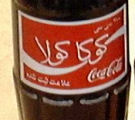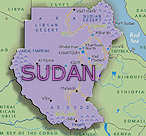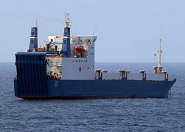 This article in the International Herald Tribune explores the prevalence of American brand name products in Iran and Sudan notwithstanding sanctions that prohibit most exports to the two countries. As we’ve noted before, much of these products are re-exported from other countries, with large quantities of American products being exported from Dubai to Iran.
This article in the International Herald Tribune explores the prevalence of American brand name products in Iran and Sudan notwithstanding sanctions that prohibit most exports to the two countries. As we’ve noted before, much of these products are re-exported from other countries, with large quantities of American products being exported from Dubai to Iran.
Two products that are ubiquitous in both countries make it through another route:
Leaving the airport at Khartoum, one of the first things you see is the ultimate symbol of American capitalism: the classic form of a Coca-Cola bottle printed on multicolored banners, next to a huge billboard for its rival, Pepsi.
…
Coca-Cola and PepsiCo have both secured export licenses from the Office of Foreign Assets Control of the U.S. Treasury, using legislation that allows blacklisted states to buy U.S agricultural commodities, medicines and medical equipment.
Coca-Cola said the syrup on which the company’s beverages are based qualified as an agricultural product. Pepsi said that its brands were produced in Sudan under “an OFAC license,” but declined to comment on the Iranian arrangement.
Although Coke syrup doesn’t immediately seem to be an “agricultural product,” the list of eligible products is quite broad and includes a broad number of prepared food products, including coffee and tea extracts. Although soft-drink extracts aren’t explicitly mentioned, they probably fall under USHTS classification 2106.90 — “food preparations not elsewhere specified” — which is included on the list of agricultural products covered under the Trade Sanctions Reform Act which permits agricultural exports to sanctioned countries.
Interestingly Coca-Cola relies on an OFAC license for agricultural products rather than the exemption under OFAC regulations for Iran and Sudan which would permit activities in Iran and Sudan by foreign subsidiaries of Coca-Cola as long as no U.S. persons aren’t involved in the foreign subsidiaries activities in the sanctioned country. That is, I think, a smart move given the difficulty of proving that foreign subsidiaries of U.S. companies act without any involvement by U.S. persons.
Pepsi’s refusal to comment on how it dispenses Coke its soft drinks in Iran, suggests that it may be relying on the foreign subsidiary exception. As long as cola syrup is seen by OFAC as an agricultural product, it’s hard to see why Pepsi relies on the foreign subsidiary exception rather than simply getting an OFAC license to export the syrup to Iran for bottling.
Even if activities in Sudan and Iran might be legal under OFAC licenses, these activities might be magnets for public criticism, particularly in Sudan. Coke seems to have cleverly sidestepped even this issue:
A Coca-Cola spokesman, Dana Bolden, said the primary motive for operating in Sudan and Iran was “to ensure quality control and protect our trademarks with the independent bottler.”
… Bolden also said the company was reinvesting all the proceeds from its sales in Sudan into programs that benefit the country. “We have committed more than $5 million over the next three years for programs aimed at building communities in Sudan.”
This, of course, doesn’t respond to the issue that Coke products in Iran might provide just the caffeine boost that its nuclear scientists need to build the bomb. Word is, however, that the average Iranian nuclear scientist prefers Austria’s Red Bull energy drink to Coca-Cola.
 The day after Susan Rice, the U.S. Ambassador to the U.N., threatened new sanctions on Eritrea, Jonathan S. Gration, the U.S. Special Envoy to Sudan, in testimony given today before the Senate Foreign Relations Committee, called for the sanctions against Sudan to be lifted. According to this report in the Christian Science Monitor, Gration questioned whether genocide is ongoing in Sudan and stated that there was no evidence to support Sudan’s continued designation as a “state sponsor of terrorism.” Instead, that designation and the sanctions only hindered efforts, he claimed, to rebuild the country and to help dislocated Sudanese living in camps.
The day after Susan Rice, the U.S. Ambassador to the U.N., threatened new sanctions on Eritrea, Jonathan S. Gration, the U.S. Special Envoy to Sudan, in testimony given today before the Senate Foreign Relations Committee, called for the sanctions against Sudan to be lifted. According to this report in the Christian Science Monitor, Gration questioned whether genocide is ongoing in Sudan and stated that there was no evidence to support Sudan’s continued designation as a “state sponsor of terrorism.” Instead, that designation and the sanctions only hindered efforts, he claimed, to rebuild the country and to help dislocated Sudanese living in camps.
 Posted by
Posted by  Category:
Category: 


 Economic sanctions continue to spread into cyberspace as Microsoft
Economic sanctions continue to spread into cyberspace as Microsoft  No, not the Pittsburgh Pirates. Real pirates, as in the Somali pirates that seized the Ukrainian merchant vessel Faina off the coast of Somalia. But before you get all excited, don pirate gear, break out a bottle of rum and start talking like a pirate, you only get to root for the pirates here because it appears that — accidentally, of course — the seizure of the Ukrainian ship might have been in the best interests of the United States, not that the pirates knew that or cared when they seized the arms-laden vessel.
No, not the Pittsburgh Pirates. Real pirates, as in the Somali pirates that seized the Ukrainian merchant vessel Faina off the coast of Somalia. But before you get all excited, don pirate gear, break out a bottle of rum and start talking like a pirate, you only get to root for the pirates here because it appears that — accidentally, of course — the seizure of the Ukrainian ship might have been in the best interests of the United States, not that the pirates knew that or cared when they seized the arms-laden vessel. This
This 

